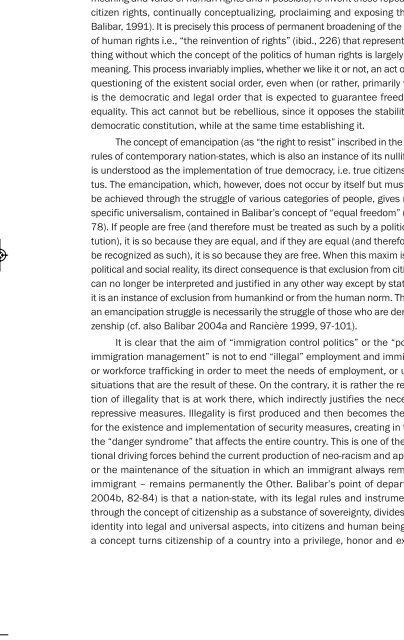The Scars of the Erasure_web
The Scars of the Erasure_web
The Scars of the Erasure_web
- No tags were found...
Create successful ePaper yourself
Turn your PDF publications into a flip-book with our unique Google optimized e-Paper software.
<strong>Erasure</strong>_4a 10.1.11 20:29 Page 269THE STRUGGLE AGAINST THE DENIAL OF CITIZENSHIP AS A PARADIGM OF EMANCIPATORY POLITICS269cracy, meaning that it always refers to <strong>the</strong> postulates <strong>of</strong> democracy while at <strong>the</strong>same time problematizing its existence. <strong>The</strong>y showed that <strong>the</strong> concept <strong>of</strong> humanrights can never be a simple or one-directional warranty <strong>of</strong> legal equality, i.e. civiland citizen rights, however important this is, but it must necessarily broaden <strong>the</strong>meaning and value <strong>of</strong> human rights and if possible, re-invent <strong>the</strong>se repeatedly ascitizen rights, continually conceptualizing, proclaiming and exposing <strong>the</strong>se (cf.Balibar, 1991). It is precisely this process <strong>of</strong> permanent broadening <strong>of</strong> <strong>the</strong> concept<strong>of</strong> human rights i.e., “<strong>the</strong> reinvention <strong>of</strong> rights” (ibid., 226) that represents somethingwithout which <strong>the</strong> concept <strong>of</strong> <strong>the</strong> politics <strong>of</strong> human rights is largely withoutmeaning. This process invariably implies, whe<strong>the</strong>r we like it or not, an act <strong>of</strong> criticalquestioning <strong>of</strong> <strong>the</strong> existent social order, even when (or ra<strong>the</strong>r, primarily when) itis <strong>the</strong> democratic and legal order that is expected to guarantee freedom andequality. This act cannot but be rebellious, since it opposes <strong>the</strong> stability <strong>of</strong> <strong>the</strong>democratic constitution, while at <strong>the</strong> same time establishing it.<strong>The</strong> concept <strong>of</strong> emancipation (as “<strong>the</strong> right to resist” inscribed in <strong>the</strong> juridicalrules <strong>of</strong> contemporary nation-states, which is also an instance <strong>of</strong> its nullification)is understood as <strong>the</strong> implementation <strong>of</strong> true democracy, i.e. true citizenship status.<strong>The</strong> emancipation, which, however, does not occur by itself but must alwaysbe achieved through <strong>the</strong> struggle <strong>of</strong> various categories <strong>of</strong> people, gives rise to aspecific universalism, contained in Balibar’s concept <strong>of</strong> “equal freedom” (2004b,78). If people are free (and <strong>the</strong>refore must be treated as such by a political institution),it is so because <strong>the</strong>y are equal, and if <strong>the</strong>y are equal (and <strong>the</strong>refore mustbe recognized as such), it is so because <strong>the</strong>y are free. When this maxim is part <strong>of</strong>political and social reality, its direct consequence is that exclusion from citizenshipcan no longer be interpreted and justified in any o<strong>the</strong>r way except by stating thatit is an instance <strong>of</strong> exclusion from humankind or from <strong>the</strong> human norm. <strong>The</strong>refore,an emancipation struggle is necessarily <strong>the</strong> struggle <strong>of</strong> those who are denied citi -zenship (cf. also Balibar 2004a and Rancière 1999, 97-101).It is clear that <strong>the</strong> aim <strong>of</strong> “immigration control politics” or <strong>the</strong> “politics <strong>of</strong>immigration management” is not to end “illegal” employment and immigration,or workforce trafficking in order to meet <strong>the</strong> needs <strong>of</strong> employment, or unlawfulsituations that are <strong>the</strong> result <strong>of</strong> <strong>the</strong>se. On <strong>the</strong> contrary, it is ra<strong>the</strong>r <strong>the</strong> reproduction<strong>of</strong> illegality that is at work <strong>the</strong>re, which indirectly justifies <strong>the</strong> necessity <strong>of</strong>repressive measures. Illegality is first produced and <strong>the</strong>n becomes <strong>the</strong> reasonfor <strong>the</strong> existence and implementation <strong>of</strong> security measures, creating in this way<strong>the</strong> “danger syndrome” that affects <strong>the</strong> entire country. This is one <strong>of</strong> <strong>the</strong> institutionaldriving forces behind <strong>the</strong> current production <strong>of</strong> neo-racism and apar<strong>the</strong>id,or <strong>the</strong> maintenance <strong>of</strong> <strong>the</strong> situation in which an immigrant always remains animmigrant – remains permanently <strong>the</strong> O<strong>the</strong>r. Balibar’s point <strong>of</strong> departure (cf.2004b, 82-84) is that a nation-state, with its legal rules and instruments andthrough <strong>the</strong> concept <strong>of</strong> citizenship as a substance <strong>of</strong> sovereignty, divides humanidentity into legal and universal aspects, into citizens and human beings. Sucha concept turns citizenship <strong>of</strong> a country into a privilege, honor and excess <strong>of</strong>


